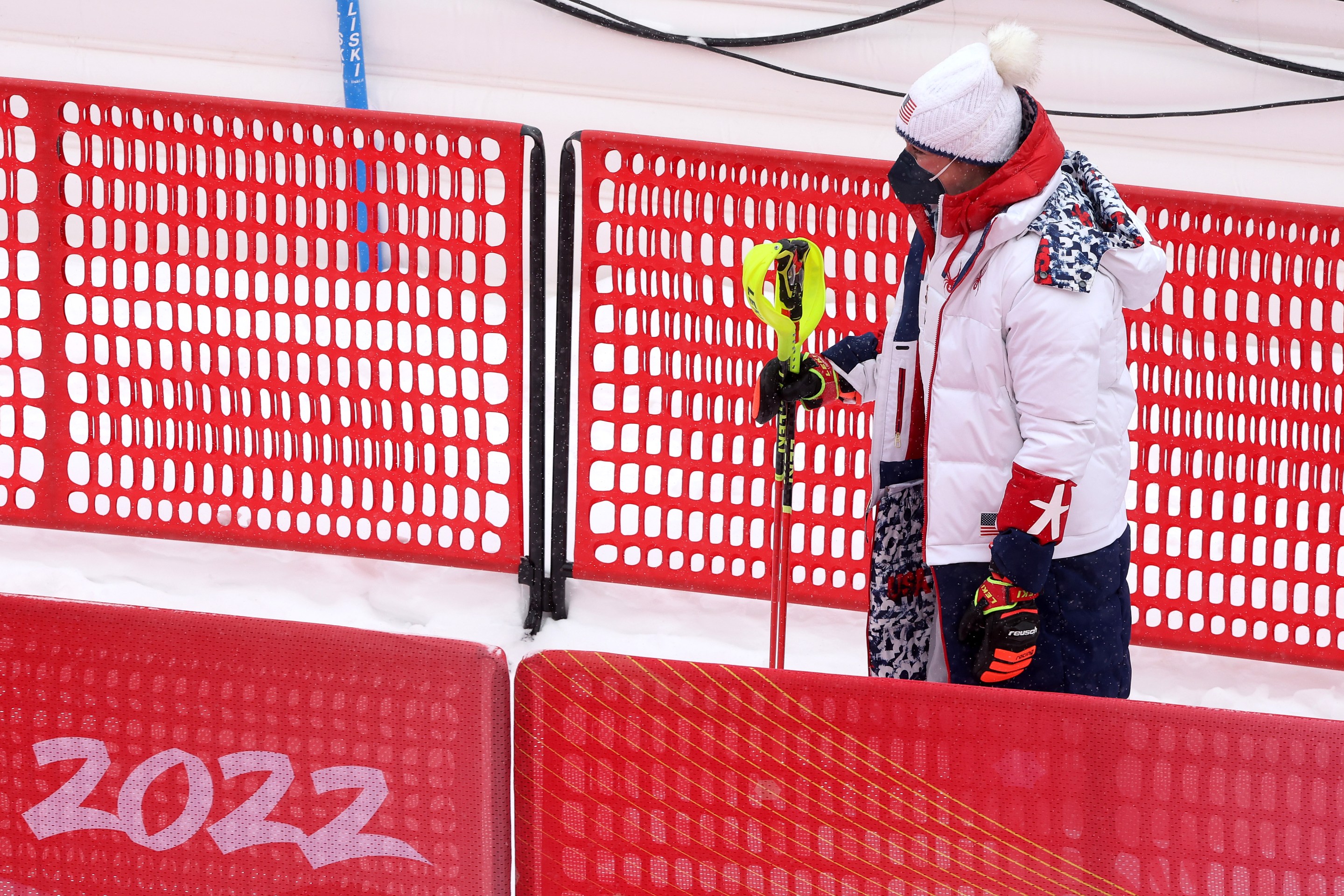Mikaela Shiffrin has things to say when she's interviewed. For most of her career, the tone of those interviews has been positive, because she has won. She arrived in Beijing with three Olympic medals, two of them gold. If she had won another gold medal at the 2022 Winter Olympics, she would have become the first American to ever win three gold medals in alpine skiing.
Of course, she didn't. When these Olympics began, NBC seemed to want to portray them as a coronation for Shiffrin—the network put a little box on screen with a countdown to Shiffrin's next event on the days she raced—but the tone of the network's coverage shifted quickly after Shiffrin skied out of the course 11 seconds into her giant slalom run. Two days after that, in the slalom event (where she was the favorite to win) she skied out on the fifth gate. I was watching this race live, and found myself with my hand clapped over my mouth as the announcers replayed the mistake over and over again. In the live images, Shiffrin sat on the edge of the course (first alone and later with a coach) for 20 minutes. NBC's cameras tried to zoom in to see her face.
At first, I (like many people) felt defensive of Shiffrin. I wanted NBC to stop showing her sitting there in agony. Heartbreak is terrible to witness live. It's uncomfortable. It felt especially miserable given that NBC had already spent a lot of time playing up the fact that Shiffrin was still grieving her father's death, and that this was her first Olympics without him. Many people were much madder than I was about NBC's coverage.
The outcry was large enough that the Associated Press did an interview with Molly Solomon, executive producer of NBC’s Olympics coverage, about why they chose to keep the cameras on Shiffrin during her painful moment.
“I’ve thought a lot about this, and if Joe Burrow or Matthew Stafford sit on the sidelines 22 minutes after the Super Bowl on Sunday, you can bet the cameras are going to stay on them,” Solomon said.
“Here we are in 2022 and we have a double standard in coverage of women’s sports,” she said. “Women’s sports should be analyzed through the same lens as the men. The most famous skier in the world did not finish her two best events. So we are going to show her sitting on the hill and analyze what went wrong. You bet we are.”
Molly Solomon, from The Associated Press
A better comparison might be: Would NBC put a camera solely on Joe Burrow if he was pulled in the second quarter of the Super Bowl, and show nothing else but his face for the next 20 minutes of the game? Probably not! And yet American viewers had to switch channels in order to see the other skiers compete. On NBC, all you could see was Shiffrin sitting on the side of the hill. As Caroline Framke wrote for Variety in the aftermath of that race, "The network’s fixation on American athletes is nothing new, but it’s still worth pointing out that its myopic approach both destabilizes people unlucky enough to live under its U.S.-centric microscope, and leaves other more compelling (and less casually cruel) stories on the table."
Once Shiffrin left the course, she gave slope-side interview to NBC. This produced yet more ire from viewers who seemed to think the network was exploiting Shiffrin in her moment of failure. The interview was indeed brutal to watch. "What are you still processing?" the NBC reporter asked while Shiffrin sniffled. "It makes me second guess the last 15 years, everything I thought I knew about my own skiing and slalom and racing mentality," Shiffrin said.
You could see Shiffrin's devastation, but you could also see her frustration (not with the reporter, but with herself). She didn't know what went wrong. She didn't know what happened. While this was airing, my feed was full of people mad at NBC for asking her questions in the media lane. But she wasn't being bombarded and she wasn't being forced.
Shiffrin was emotional about her performance, but having emotions does not automatically mean that something is harmful. The Olympics are emotional! It is hard to see heartbreak on television, and to see an athlete's dreams be crushed. It is even harder to watch when that athlete is someone like Shiffrin, who shouldered so many expectations and then was reduced to apologizing to viewers for her poor performance. But an athlete confronting these emotions, and doing so on live television, doesn't need to be a taboo.
Conversations about athletes and their mental health become muddied far too quickly and easily. Perhaps it is due to the proliferation of self-care discourse on social media, but so often it feels like the concept of personal agency dissolves, and in its place sits the idea that anything that is in any way damaging to an athlete's mental health must be treated as gravely as the most catastrophic of injuries. But the goal of making conversations about mental health more mainstream should not be to turn everyone with a TV into armchair psychologists, nor should it be to make everyone tiptoe around athletes so as to never upset them. The goal should be to remove the stigma so that athletes like Shiffrin feel comfortable and empowered to speak openly about their struggles and failures, when and if they want to.
Mental health was a big topic of conversation when Simone Biles got the twisties, and when Naomi Osaka refused to do press at the French Open (and eventually withdrew form the competition) to protect her mental health. Both of those women chose to set their own boundaries. Had Shiffrin asked a camera to get out of her face, I would agree she shouldn't have been interviewed. Had she said "no comment" to the reporters over and over again, I would support her right to do that. But she didn't. For whatever reason, you and I don't know, she chose to give that interview. It was raw and emotional and hard to watch, but that doesn't mean it was harmful.
On Thursday morning, Shiffrin competed in the slalom section of the women's combined event , and for the third time at these Olympics she skied out of the course. Once again, she chose to speak to the media afterwards. During that interview, her tone was radically different than in her previous interview. Shiffrin was obviously disappointed to have failed to finish yet another race, but where there was previously anguish and bewilderment, Shiffrin projected a sense of wry acceptance of the fact that sometimes things just don't go your way.
"Oh, man, I don't know if anybody has failed that hard with so many opportunities maybe in the history of the Olympics," she said. "But I'll take it. I mean, it is a joke. That's fine. I just really selfishly wanted to have a good run of slalom down this hill, and I'll be left wanting there." She went on to say that even though she didn't medal, she was proud of the work she did in Beijing.
Shiffrin's final interview was no more invasive, unfair, or exploitative than any of her previous interviews. And it was made all the more meaningful, for both Shiffrin and the audience, by the fact that it came after those hard-to-watch conversations. Over the course of these Olympics, Shiffrin was allowed to feel her emotions, and to share them with us as they changed, and as as she saw fit. Because of that, viewers gained a better understanding of how failure weighs on an elite athlete, and how they can start to accept and move on from that failure. That feels a lot less like exploitation and a lot more like progress.






